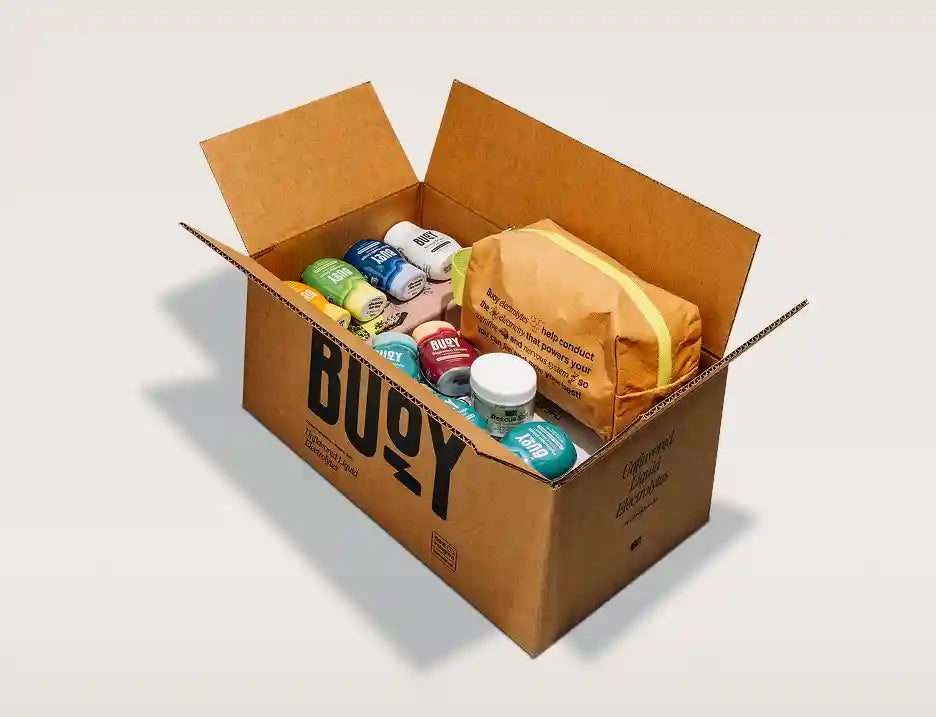
Managing Blood Pressure Safely With Electrolytes
Share
Many people think of electrolytes as something you only need after a workout or during hot weather. But these charged minerals do far more than keep you hydrated, they also help your body manage blood pressure.
At Buoy, we often talk about hydration and balance. That balance depends heavily on electrolytes like sodium, potassium, magnesium, and calcium, each influencing how your blood vessels expand, contract, and hold onto fluids.
Our Rescue Drops deliver a clean, sugar-free blend of electrolytes designed to support healthy cardiovascular function.
Essential Takeaways
- Electrolytes such as sodium, potassium, magnesium, and calcium directly influence fluid balance and blood vessel tone, both key factors in blood pressure.
- Most people consume too much sodium and not enough potassium, magnesium, or calcium.
- Diets rich in fruits, vegetables, legumes, and dairy or fortified milks can help maintain healthy electrolyte levels naturally.
- Balance matters more than any single nutrient.
- Hydration supports the proper movement of electrolytes throughout the body.
- Clean-label electrolyte supplements can support daily hydration but are not treatments for high blood pressure.
If you’ve been told to “watch your salt,” or you’re trying to manage blood pressure naturally, understanding how electrolytes work together can make a big difference.
- What Do Electrolytes Actually Do
- How Do Electrolytes Affect Blood Pressure
- Sodium: How Much Is Too Much?
- Potassium: Sodium’s Natural Counterbalance
- Magnesium: The Quiet Regulator
- Calcium: Subtle but Essential
- Balancing Electrolytes Naturally
- Quick Mineral Reference Table
- Practical Tips for Maintaining Blood Pressure
- FAQs
What Do Electrolytes Actually Do
Electrolytes are minerals that carry an electric charge in body fluids. They move in and out of cells, helping maintain the right amount of water inside and outside them. Their key functions include:
- Regulating fluid levels
- Supporting nerve communication and muscle contraction
- Helping the heart beat steadily
- Maintaining healthy blood vessel function
How Do Electrolytes Affect Blood Pressure
Blood pressure depends on both the amount of fluid in your bloodstream and the flexibility of your blood vessels. Electrolytes influence both.
Sodium controls how much water your body retains. High sodium intake leads to fluid retention and higher blood volume, which can raise blood pressure.
Potassium helps your body release extra sodium and relax blood vessel walls, supporting healthy circulation.
Magnesium encourages blood vessels to relax after they contract and helps nerve signals flow smoothly.
Calcium assists with the contraction and relaxation of blood vessels, keeping them responsive and flexible.
When these minerals fall out of balance, too much sodium, too little potassium or magnesium, blood vessels may narrow, and pressure can rise.
Sodium: How Much Is Too Much?
Sodium isn’t the enemy. It’s essential for fluid regulation and muscle function. The issue is quantity.
The World Health Organization recommends adults consume no more than 2,000 milligrams (2 grams) of sodium per day, about one teaspoon of salt. Many people exceed this through processed foods, sauces, soups, and restaurant meals.
Instead of eliminating sodium, focus on balance. Choose fresh foods, limit packaged snacks, and be mindful of hidden sources. Pairing moderate sodium intake with adequate potassium and magnesium helps counter its effects.
If you’re curious about sodium’s broader impact on hydration, check out our post Does Sodium Dehydrate You?
Potassium: Sodium’s Natural Counterbalance
Potassium acts as sodium’s regulator. It helps your kidneys excrete extra sodium and relaxes blood vessel walls, both crucial for blood pressure control.
Foods naturally rich in potassium include:
- Bananas
- Beans and lentils
- Potatoes
- Leafy greens
- Yogurt and fortified dairy alternatives
Despite being easy to find, most people still fall short of daily potassium needs, especially if their diet is low in fruits and vegetables.
Those with kidney conditions or on certain medications (like ACE inhibitors or ARBs) should consult a healthcare professional before changing their potassium intake.
You can also explore more about nutrition and minerals in our guide on POTS Nutrition: Vitamins and Supplements.
Magnesium: The Quiet Regulator
Magnesium supports hundreds of processes in the body, including those that control vascular tone and nerve communication. It helps muscles, including those in your arteries, relax after contracting.
Research suggests magnesium supplementation can produce modest average reductions in blood pressure, particularly among people with metabolic or insulin resistance issues.
Good dietary sources include:
- Nuts and seeds
- Whole grains
- Legumes
- Leafy greens
Rescue Drops include bioavailable magnesium to help replenish what sweat and stress can deplete, without added sugar or artificial sweeteners.
Calcium: Subtle but Essential
Calcium’s role in blood pressure is often overlooked. While best known for bone health, calcium helps coordinate the contraction and relaxation of blood vessels.
Adequate calcium intake may support healthier average blood pressure readings, but supplements don’t always have the same effect as food sources. Focus on:
- Dairy or fortified plant milks
- Tofu
- Sardines or salmon with bones
- Leafy greens
Balancing Electrolytes Naturally
The ideal approach to healthy blood pressure is nutrient balance plus hydration.
Knowing what foods are high in electrolytes and consuming a diet filled with fruits, vegetables, legumes, nuts, and whole grains provides potassium, magnesium, and calcium in forms your body absorbs efficiently.
When you sweat, travel, or experience heat stress, your electrolyte balance can shift. That’s where clean electrolyte support comes in. Rescue Drops are sugar-free and made to complement, not replace, your daily nutrition and hydration habits.
They help restore electrolyte balance during busy days, long flights, or recovery from workouts, supporting overall cardiovascular wellness.
Quick Mineral Reference Table
| Electrolyte | Main Function | Common Food Sources | Research Insight |
|---|---|---|---|
| Sodium | Regulates fluid balance | Bread, soups, sauces, processed foods | Excess intake linked to higher blood pressure |
| Potassium | Helps excrete sodium and relax blood vessels | Beans, lentils, bananas, greens, yogurt | Higher intake linked to healthier pressure readings |
| Magnesium | Supports muscle and vessel relaxation | Nuts, seeds, whole grains, greens | Supplementation shows modest reductions in blood pressure |
| Calcium | Aids vessel contraction and relaxation | Dairy, tofu, fortified milks, greens | Adequate intake associated with small improvements in blood pressure |
Practical Tips for Maintaining Blood Pressure with Electrolyte Balance
- Eat a variety of fruits, vegetables, legumes, and nuts daily.
- Limit heavily processed, high-sodium foods.
- Stay hydrated with water or sugar-free electrolyte drinks.
- Include calcium-rich foods like yogurt or fortified plant milks.
- Speak with your doctor before making major dietary changes if you take medication affecting electrolytes.
FAQs
Can electrolytes help lower high blood pressure?
Electrolytes can help lower blood pressure when there’s an imbalance, especially when sodium is high and potassium or magnesium is low. Supporting your diet with potassium and magnesium helps your body excrete extra sodium and relax blood vessel walls, which may lead to more normal readings.
Are Rescue Drops safe for people with hypertension?
Rescue Drops are designed to be clean and sugar-free, delivering bioavailable electrolytes rather than stimulants or excess sodium. For many with hypertension, supplementing with potassium and magnesium while moderating sodium can be safe and beneficial. However, anyone on blood pressure medications or with kidney disease should consult their physician before starting any new electrolyte regimen.
How much potassium do I need to balance sodium?
The World Health Organization recommends adults aim for several thousand milligrams of potassium per day while keeping sodium below 2,000 mg. Exact amounts depend on factors like kidney function, diet, and medication, so medical guidance is best.
Can too much electrolyte intake raise blood pressure?
Yes. If electrolytes are taken in excessive amounts, particularly sodium, or if kidney function is impaired, blood pressure can rise. Too much sodium increases fluid retention, while too much potassium or magnesium in sensitive individuals can cause complications. Using a controlled product like Rescue Drops, starting slowly, and ensuring kidney health are the safest approaches.
When should I use Rescue Drops for blood pressure support?
Rescue Drops are especially useful after high-sodium meals, during hot weather, or after intense workouts, essentially all times when fluid and mineral balance can shift. Using drops before or during these periods can help stabilize hydration and support healthy vascular tone.
How quickly might I expect effects on blood pressure?
Results vary. Some people notice small improvements in how they feel within days of correcting electrolyte imbalances and hydration. For measurable improvements in blood pressure, consistent hydration and balanced nutrition over several weeks tend to be more effective. Ongoing medical monitoring is always recommended.
Learn More About Buoy
Rescue Drops deliver a clean, balanced blend of electrolytes, without sugar or artificial ingredients, to support hydration, balance, and cardiovascular wellness. Add a squeeze to any drink for an easy, effective way to maintain electrolyte balance and hydration every day.
References
- Iqbal S, Klammer N, Ekmekcioglu C. (2019). The effect of electrolytes on blood pressure: a summary of meta-analyses. Nutrients, 11(6), 1362.
- Zhang X et al. (2016). Effects of magnesium supplementation on blood pressure. Hypertension.
- American Journal of Hypertension. (2024). Potassium and Hypertension: A State-of-the-Art Review.
- Harvard Health Publishing — Key minerals to help control blood pressure
- NIH Office of Dietary Supplements — Magnesium: Fact Sheet for Health Professionals
- NIH Office of Dietary Supplements — Potassium: Fact Sheet for Health Professionals




